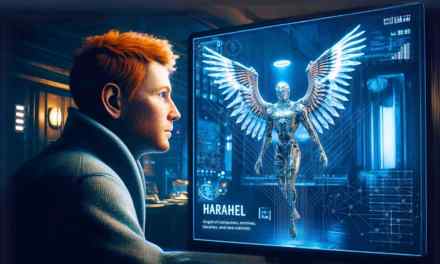After we killed the guard, Glaucon and I ran down the corridor away from the Well. Glaucon had been seriously aged in the fight. He limped and cursed, a piece of dying meat and he knew it. I brushed my hand along the wall looking for a door.
“We’ll make it,” I said.
“Sure,” he said. He held his arm against his side.
We ran past a series of ontological windows: a forest fire, a sun in space, a factory refashioning children into flowers. I worried that the corridor might be a loop. For all I knew, the sole purpose of such corridors was to confuse and recapture escapees. Or maybe the corridors were just for fun. The Relativists delight in such absurdities.
More windows: a snowstorm, a cloudy seascape, a corridor exactly like the one we were in, in which two men wearing yellow robes — prison kosodes like ours — searched for a way out. Glaucon stopped. The hand of his double reached out to meet his. The face of mine stared at me angrily; a strong face, an intelligent one. “It’s just a mirror,” I said.
“Mirror?”
“A mirror,” a voice said. Protagoras appeared ahead of us in the corridor. “Like sex, it reproduces human beings.”
An old joke, and typical of Protagoras to quote it without attribution.
Glaucon raised his clock. In the face of Protagoras’ infinite mutability it was less than useless: There was no way Glaucon would even get a shot off. My spirit sank as I watched the change come over him. Protagoras dripped fellowship. Glaucon liked him. Nobody but a maniac could dislike Protagoras.
It took all my will to block the endorphin assault, but Glaucon was never as strong as I. A lot of talk about brotherhood had passed between us, but if I’d had my freedom I would have crisped him on the spot. Instead I hid myself from Protagoras’ blue eyes, as cold as chips of aquamarine in a mosaic.
“Where are you going?” Protagoras said.
“We were going —” Glaucon started.
“— nowhere,” I said.
“A hard place to get to,” said Protagoras.
Glaucon’s head bobbed like a dog’s.
“I know a short way,” Protagoras said. “Come along with me.”
“Sure,” said Glaucon.
I struggled to maintain control. If you had asked him, Protagoras would have denied controlling anyone: “The Superior Man rules by humility.” Another sophistry.
We turned back down the corridor. If I stayed with them until we got to the center, there would be no way I could escape. Desperation forced me to test the reality of one of the windows. As we passed the ocean scene, I pushed Glaucon into Protagoras and threw my shoulder against the glass. The window shattered; I was falling. My kosode flapped like the melting wings of Icarus as sky and sea whirled around me, and I hit the water. My breath exploded from me. I flailed and tumbled. At last I found the surface. I sputtered and gasped, my right arm in agony; my ribs ached. I kicked off my slippers and leaned onto my back. The waves rolled me up and down. The sky was low and dark. At the top of each swell I could see to the storm-clouded horizon, flat as a psychotic’s affect — but in the other direction was a beach.
I swam. The bad shoulder made it hard, but at that moment I would not have traded places with Glaucon for all the enlightenment of the ancients.
***
When they sent me to the penal colony they told me, “Prisons ought to be places where people are lodged only temporarily, as guests are. They must not become dwelling places.”
Their idea of temporary is not mine. Temporary doesn’t mean long enough for your skin to crack like the dry lakebed outside your window, for the memory of your lover’s touch to recede until it’s only a torment in your dreams, as distant as the mountains that surround the prison. These distinctions are lost on Relativists, as are all distinctions. Which, I suppose, is why I was sent there.
They keep you alone, mostly. I don’t mind the isolation — it gave me time to understand exactly how many ways I had been betrayed. I spent hours thinking of Areté, etching her ideal features in my mind. I remembered how they’d ripped me away from her. I wondered if she still lived, and if I would ever see her again. Eventually, when memory had faded, I conquered the passage of time itself: I reconstructed her image from incorruptible ideas and planned the revenge I would take once I was free again, so that the past and the future became more real to me than the endless, featureless present. Such is the power of idea over reality. To the guards I must have looked properly meditative. Inside I burned.
Each day at dawn we would be awakened by the rapping of sticks on our iron bedsteads. In the first hour we drew water from the Well of Changes. In the second we were encouraged to drink (I refused). In the third we washed floors with the water. From the fourth through the seventh we performed every other function that was necessary to maintain the prison. In the eighth we were tortured. At the ninth we were fed. At night, exhausted, we slept.
The torture chamber is made of ribbed concrete. It is a cold room, without windows. In its center is a chair, and beside the chair a small table, and on the table the hood. The hood is black and appears to be made of ordinary fabric, but it is not. The first time I held it, despite the evidence of my eyes I thought it had slipped through my fingers. The hood is not a material object: You cannot feel it, and it has no texture, and although it absorbs all light it is neither warm nor cold.
Your inquisitor invites you to sit in the chair and slip the hood over your head. You do so. He speaks to you. The room disappears. Your body melts away, and you are made into something else. You are an animal. You are one of the ancients. You are a stone, a drop of rain in a storm, a planet. You are in another time and place. This may sound intriguing, and the first twenty times it is. But it never ends. The sessions are indiscriminate. They are deliberately pointless. They continue to the verge of insanity.

I recall one of these sessions, in which I lived in an ancient city and worked a hopeless routine in a store called the “World of Values.” The values we sold were merchandise. I married, had children, grew old, lost my health and spirit. I worked forty years. Some days were happy, others sad; most were neither. The last thing I remembered was lying in a hospital bed, unable to see, dying, and hearing my wife talk with my son about what they should have for dinner. When I came out from under the hood, Protagoras yanked me from the chair and told me this poem:
Out from the nostrils of the Great Buddha
Flew a pair of nesting swallows.

I could still hear my phantom wife’s cracking voice. I was in no mood for riddles. “Tell me what it means.”
“Drink from the Well and I’ll tell you.”
I turned my back on him.
It was always like that. Protagoras had made a career out of tormenting me. I had known him for too many years. He put faith in nothing, was totally without honor, yet he had power. His intellect was available for any use. He wasted years on banalities. He would argue any side of a case, not because he sought advantage, but because he did not care about right or wrong. He was intolerably lucky. Irresponsible as a child. Inconstant as the wind. His opaque blue gaze could be as witless as a scientist’s.
And he had been my first teacher. He had introduced me to Areté, offered me useless advice throughout our stormy relationship, given ambiguous testimony at my trial, and upon the verdict abandoned the university in order to come to the prison and become my inquisitor. The thought that I had once idolized him tormented me more than any session under the hood.
After my plunge through the window into the sea, I fought my way through the surf to the beach. For an unknown time I lay gasping on the wet sand. When I opened my eyes I saw a flock of gulls had waddled up to me. An arm’s length away the lead gull, a great bull whose ragged feathers stood out from his neck in a ruff, watched me with beady black eyes. Others of various sizes and markings stood in a wedge behind him. I raised my head; the gulls retreated a few steps, still holding formation. I understood immediately that they were ranked according to their stations in the flock. Thus does nature shadow forth fundamental truth: the rule of the strong over the weak, the relation of one to many in hierarchical order.
Off to the side stood a single scrawny gull, quicker than the rest, but separate, aloof. I supposed him to be a gullish philosopher. I saluted him, my brother.
A sandpiper scuttled along the edge of the surf. Dipping a handful of seawater, I washed sand and pieces of shell from my cheek. Up the slope, saw grass and sea oats held the dunes against the tides. The scene was familiar. With wonder and some disquiet I understood that the window had dumped me into the Great Water quite near the Imperial City.
I stumbled up the sand to the crest of the dunes. In the east, beneath piled thunderheads, lightning flashed over the dark water. To the west, against the sunset’s glare, the sand and scrub turned into fields. I started inland. Night fell swiftly. From behind me came clouds, strong winds, then rain. I trudged on, singing into the downpour. The thunder sang back. Water streamed down the creases of my face, the wet kosode weighed on my chest and shoulders, the rough grass cut my feet. In the profound darkness I could continue only by memorizing the landscape revealed by flashes of lightning. Exhilarated, I hurried toward my lover. I shouted at the raindrops, any one of which might be one of my fellow prisoners under the hood. “I’m free!” I told them. I forded the swollen River of Indifference. I stumbled through Iron Tree Forest. Throughout the night I put one foot before the other, and some hours before dawn, in a melancholy drizzle, passed through the Heron’s Gate into the city.
In the Processor’s Quarter I found a doorway whose overhang kept out the worst of the rain. Above hung the illuminated sign of the Rat. In the corner of this doorway, under this sign, I slept.
***

I was awakened by the arrival of the owner of the communications shop in whose doorway I had slept.
“I am looking for the old fox,” I said. “Do you know where I can find him?”
“Who are you?”
“You may call me the little fox.”
He pushed open the door. “Well, Mr. Fox, I can put you in touch with him instantly. Just step into one of our booths.”
He must have known I had no money. “I don’t want to communicate. I want to see him.”
“Communication is much better,” the shop owner said. He took a towel, a copper basin, and an ornamental blade from the cupboard beneath his terminal. “No chance of physical violence. No distress other than psychological. Completely accurate reproduction. Sensory enhancement: olfactory, visual, auditory.” He opened a cage set into the wall and seized a docile black rat by the scruff of the neck. “Recordability. Access to a network of supporting information services. For slight additional charge we offer intelligence augmentation and instant semiotic analysis. We make the short man tall. Physical presence has nothing to compare.”
“I want to speak with him in private.”
Not looking at me, he took the rat to the stone block. “We are bonded.”
“I don’t question your integrity.”
“You have religious prejudices against communication? You are a Traveler?”
He would not rest until he forced me to admit I was penniless. I refrained from noting that, if he was such a devout communicator, he could easily have stayed home. Yet he had walked to his shop in person. Swallowing my rage, I said, “I have no money.”
He sliced the rat’s neck open. The animal made no sound.
After he had drained the blood and put the carcass into the display case, he washed his hands and turned to me. He seemed quite pleased with himself. He took a small object from a drawer. “He is to be found at the university. Here is a map of the maze.” He slipped it into my hand.
For this act of gratuitous charity, I vowed that one day I would have revenge. I left.
The streets were crowded. Dusty gold light filtered down between the ranks of ancient buildings. Too short to use the moving ways, I walked. Orange-robed messengers threaded their way through the crowd. Sweating drivers in loincloths pulled pedicabs; I imagined the perfumed lottery winners who reclined behind the opaqued glass of their passenger compartments. In the Medical Quarter, street-side surgeons hawked their services in front of racks of breasts and penises of prodigious size. As before, the names of the streets changed hourly to mark the progress of the sun across the sky. All streets but one, and I held my breath when I came to it: the Way of Enlightenment, which ran between the reform temple and the Imperial Palace. As before, metamorphs entertained the faithful on the stage outside the temple. One of them changed shape as I watched, from a dog-faced man wearing the leather skirt of an athlete to a tattooed ceo in powered suit. “Come drink from the Well of Changes!” he called ecstatically to passersby. “Be reformed!”
The Well he spoke of is both literal and symbolic. The prison Well was its brother; the preachers of the temple claim that all the Wells are one Well. Its water has the power to transform both body and mind. A scientist could tell you how it is done: viruses, brain chemistry, hypnosis, some insane combination of the three. But that is all a scientist could tell you. Unlike a scientist, I could tell you why its use is morally wrong. I could explain that some truths are eternal and ought to be held inviolate, and why a culture that accepts change indiscriminately is rotten at its heart. I could demonstrate, with inescapable logic, that reason is better than emotion. That spirit is greater than flesh. That Relativism is the road to hell.
Instead of relief at being home, I felt distress. The street’s muddle upset me, but it was not simply that: The city was exactly as I had left it. The wet morning that dawned on me in the doorway might have been the morning after I was sent away. My absence had made no discernible difference. The tyranny of the Relativists that I and my friends had struggled against had not culminated in the universal misery we had predicted. Though everything changed minute to minute, it remained the same. The one thing that ought to remain constant, Truth, was to them as chimerical as the gene-changers of the temple.
They might have done better, had they had teachers to tell them good from bad.
Looking down the boulevard, in the distance, at the heart of the city, I could see the walls of the palace. By midday I had reached it. Vendors of spiced cakes pushed their carts among the petitioners gathered beneath the great red lacquered doors. One, whose cakes each contained a free password, did a superior business. That the passwords were patent frauds was evident by the fact that the gatekeeper ignored those petitioners who tried using them. But that did not hurt sales. Most of the petitioners were halflings, and a dim-witted rabbit could best them in a deal.
I wept for my people, their ignorance and illogic. I discovered that I was clutching the map in my fist so tightly that the point of it had pierced my skin. I turned from the palace and walked away, and did not feel any relief until I saw the towers of the university rising above Scholars’ Park. I remembered my first sight of them, a young boy down from the hills, the smell of cattle still about me, come to study under the great Protagoras. The meticulously kept park, the calm proportions of the buildings, spoke to the soul of that innocent boy: Here you’ll be safe from blood and passion. Here you can lose yourself in the world of the mind.
The years had worn the polish off that dream, but I can’t say that, seeing it now, once more a fugitive from a dangerous world, I did not feel some of the same joy. I thought of my mother, a loutish farmer who would whip me for reading; of my gentle father, brutalized by her, trying to keep the flame of truth alive in his boy.
On the quadrangle I approached a young woman wearing the topknot and scarlet robe of a humanist. Her head bounced to some inner rhythm, and as I imagined she was pursuing some notion of the Ideal, my heart went out to her. I was about to ask her what she studied when I saw the pin in her temple. She was listening to transtemporal music: her mind eaten by puerile improvisations played on signals picked up from the death agonies of the cosmos. Generations of researchers had devoted their lives to uncovering these secrets, only to have their efforts used by “artists” to erode people’s connections with reality. I spat on the walk at her feet; she passed by, oblivious.
At the entrance to the humanities maze I turned on the map and followed it into the gloom. Fifteen minutes later it guided me into the Department of Philosophy. It was the last place I expected to find the fox — the nest of our enemies, the place we had plotted against tirelessly. The secretary greeted me pleasantly.
“I’m looking for a man named Socrates,” I said. “Some call him ‘the old fox.’”
“Universe of Discourse 3,” she said.
I walked down the hall, wishing I had Glaucon’s clock. The door to the hall stood open. In the center of the cavelike room, in a massive support chair, sat Socrates. At last I had found a significant change: He was grossly obese. The ferretlike features I remembered were folded in fat. Only the acute eyes remained. I was profoundly shaken. As I approached, his eyes followed me.
“Socrates.”
“Blume.”
“What happened to you?”
Socrates lifted his dimpled hand, as if to wave away a triviality.
“I won.”
“You used to revile this place.”
“I reviled its usurpers. Now I run it.”
“You run it?”
“I’m the dean.”
I should have known Socrates had turned against our cause, and perhaps at some level I had. If he had remained true, he would have ended up in a cell next to mine. “You used to be a great teacher,” I said.
“Right. Let me tell what happens when a man starts claiming he’s a great teacher. First he starts wearing a brocade robe. Then he puts lifts in his sandals. The next thing you know the department’s got a nasty paternity suit on its hands.”
His senile chuckle was like the bubbling of water in an opium pipe.
“How did you get to be dean?”
“I performed a service for the Emperor.”
“You sold out!”
“Blume the dagger,” he said. Some of the old anger shaded his voice. “So sharp. So rigid. You always were a prig.”
“And you used to have principles.”
“Ah, principles,” he said. “I’ll tell you what happened to my principles. You heard about Philomena the Bandit?”
“No. I’ve been somewhat out of touch.”
Socrates ignored the jab. “It was after you left. Philomena invaded the system, established her camp on the moon, and made her living raiding the empire. The city was at her mercy. I saw my opportunity. I announced that I would reform her. My students outfitted a small ship, and Areté and I launched for the moon.”
“Areté!”
“We landed in a lush valley near the camp. Areté negotiated an audience for me. I went, alone. I described to Philomena the advantages of politic behavior. The nature of truth. The costs of living in the world of shadows and the glory of moving into the world of light. How, if she should turn to Good, her story would be told for generations. Her fame would spread throughout the world and her honor outlast her lifetime by a thousand years.
“Philomena listened. When I was finished she drew a knife and asked me, ‘How long is a thousand years?’
“Her men stood all around, waiting for me to slip. I started to speak, but before I could she pulled me close and pushed the blade against my throat.
“‘A thousand years,’ Philomena said, ‘is shorter than the exposure of a neutrino passing through a world. How long is life?’
“I was petrified. She smiled. ‘Life,’ she said, ‘is shorter than this blade.’
“I begged for mercy. She threw me out. I ran to the ship, in fear for my life. Areté asked what happened: I said nothing. We set sail for home.
“We landed amid great tumult. I first thought it was riot but soon found it celebration. During our voyage back Philomena had left the moon. People assumed I had convinced her. The Emperor spoke. Our enemies in philosophy were shortened, and the regents stretched me into dean.
“Since then,” Socrates said, “I have had trouble with principles.”
“You’re a coward,” I said.
Despite the mask of suet, I could read the ruefulness in Socrates’ eyes. “You don’t know me,” he said.
“What happened to Areté?”
“I have not seen her since.”
“Where is she?”
“She’s not here.” He shifted his bulk, watching the screen that encircled the room. “Turn yourself in, Blume. If they catch you, it will only go harder.”
“Where is she?”
“Even if you could get to her, she won’t want to see you.”
I seized his arm, twisted. “Where is Areté!”
Socrates inhaled sharply. “In the palace,” he said.
“She’s a prisoner?”
“She’s the Empress.”
***
That night I took a place among the halflings outside the palace gate. Men and women regrown from seed after their deaths, imprinted with stored files of their original personalities, all of them had lost resolution, for no identity file could encapsulate human complexity. Some could not speak, others displayed features too stiff to pass for human, and still others had no personalities at all. Their only chance for wholeness was to petition the Empress to perform a transfinite extrapolation from their core data. To be miraculously transformed.
An athlete beside me showed me his endorsements. An actress showed me her notices. A banker showed me his lapels. They asked me my profession. “I am a philosopher,” I said.
They laughed. “Prove it,” the actress said.
“In the well-ordered state,” I told her, “there will be no place for you.” To the athlete I said, “Yours is a good and noble profession.” I turned to the banker. “Your work is more problematical,” I said. “Unlike the actress, you fulfill a necessary function, but unlike the athlete, by accumulating wealth you are likely to gain more power than is justified by your small wisdom.”
This speech was beyond them: The actress grumbled and went away. I left the two men and walked along below the battlements. Two bartizans framed the great doors, and archers strolled along the ramparts or leaned through the embrasures to spit on the petitioners. For this reason the halflings camped as far back from the walls as they might without blocking the street. The archers, as any educated man knew, were there for show: The gates were guarded only by a single gatekeeper, a monk who could open the door if bested in a battle of wits, but without whose acquiescence the door could not be budged. He sat on his stool beside the gate, staring quietly ahead. Those who tried to talk to him could not tell whether they’d get a cuff on the ear or a friendly conversation. His flat, peasant’s face was so devoid of intellect that it was some time before I recognized him as Protagoras.
His disguised presence could be one of his whims. Or it could be he was being punished for letting me escape; it could be that he waited for me. I felt an urge to run. But I would not duplicate Socrates’ cowardice. If Protagoras recognized me he did not show it, and I resolved to get in or get caught. I was not some half-wit, and I knew him. I approached. “I wish to see the Empress,” I said.
“You must wait.”
“I’ve been waiting for years.”
“That doesn’t matter.”
“I have no more time.”
He studied me. His manner changed. “What will you pay?”
“I’ll pay you a story that will make you laugh until your head aches.”
He smiled. I saw that he recognized me; my stomach lurched. “I know many such stories,” he said.
“Not like mine.”
“Yes. I can see you are a great breeder of headaches.”
Desperation drove me forward. “Listen, then: Once there was a warlord who discovered that someone had stolen his most precious possession, a jewel of power. He ordered his servants to scour the fortress for strangers. In the bailey they found a beggar heading for the gate. The lord’s men seized him and carried him to the well. ‘The warlord’s great jewel is lost,’ they said to him. They thrust the beggar’s head beneath the water. He struggled. They pulled him up and asked, ‘Where is the jewel?’
“‘I don’t know,’ he said.
“They thrust him down again, longer this time. When they pulled him up he sputtered like an old engine. ‘Where is the jewel?’ they demanded. ‘I don’t know!’ he replied.
“Furious at his insolence, fearful for their lives if they should rouse their lord’s displeasure, the men pushed the beggar so far into the well that a bystander thought, ‘He will surely drown.’ The beggar kicked so hard it took three strong men to hold him. When at last they pulled him up he coughed and gasped, face purple, struggling to speak. They pounded him on the back. Finally he drew breath enough for words.
“‘I think you should get another diver,’ the beggar said. ‘I can’t see it anywhere down there.’”
Protagoras smiled. “That’s not funny.”
“What?”
“Maybe for us, but not for the beggar. Or the bystander. Or the servants. The warlord probably had them shortened.”
“Don’t play games. What do you really think?”
“I think of poor Glaucon. He misses you.”
Then I saw that Protagoras only meant to torment me, as he had so many times before. He would answer my desperate need with feeble jokes until I wept or went mad. A fury more powerful than the sun itself swept over me, and I lost control. I fell on him, kicking, biting. The petitioners looked on in amazement. Shouts echoed from the ramparts. I didn’t care. I’d forgotten everything but my rage; all I knew was that at last I had him in my hands. I scratched at his eyes, I beat his head against the pavements. Protagoras struggled to speak. I pulled him up and slammed his head against the doors. The tension went out of his muscles. Cross-legged, as if preparing to meditate, he slid to the ground. Blood glistened in the torchlight on the lacquered doors. “Now that’s funny,” he whispered, and died.
The weight of his body against the door pushed it ajar. It had been open all along.
***
No one came to arrest me. Across the inner ward, at the edge of an ornamental garden, a person stood in the darkness beneath a plane tree. Most of the lights of the palace were unlit, but radiance from the clerestory above heightened the shadows. Hesitantly I drew closer, too unsteady after my sudden fit of violence to hide. In my confusion I could think to do no more than approach the figure in the garden, who stood patiently as if in long expectation of me. From ten paces away I saw it was a woman dressed as a clown. From five I saw it was Areté.
Her laughter, like shattering crystal, startled me. “How serious you look!”
My head was full of questions. She pressed her fingers against my lips, silencing them. I embraced her. Red circles were painted on her cheeks, and she wore a crepe beard, but her skin was still smooth, her eyes bright, her perfume the same. She was not a day older.
The memory of dead Protagoras’ slack mouth marred my triumph. She ducked out of my arms, laughing again. “You can’t have me unless you catch me!”
“Areté!”
She darted through the trees. I ran after her. My heart was not in it, and I lost her until she paused beneath a tree, hands on knees, panting. “Come on! I’m not so hard to catch.”
The weight was lifted from my heart. I dodged after her. Beneath the trees, through the hedge maze, among the night-blooming jasmine and bougainvillea, the silver moon tipping the edges of the leaves, I chased her. At last she let herself be caught; we fell together into a damp bed of ivy. I rested my head on her breast. The embroidery of her costume was rough against my cheek.
She took my head in her hands and made me look her in the face. Her teeth were pearly white, breath sweet as the scented blossoms around us.
We kissed, through the ridiculous beard (I could smell the spirit gum she’d used to affix it), and the goal they had sought to instill in me at the penal colony was attained: My years of imprisonment vanished into the immediate moment as if they had never existed.
***
That kiss was the limit of our contact. I expected to spend the night with her; instead, she had a slave take me to a guesthouse for visiting dignitaries, where I was quartered with three minor landholders from the mountains. They were already asleep. After my day of confusion, rage, desire, and fear, I lay there weary but hard awake, troubled by the sound of my own breathing. My thoughts were jumbled white noise. I had killed him. I had found her. Two of the fantasies of my imprisonment fulfilled in a single hour. Yet no peace. The murder of Protagoras would not long go unnoticed. I assumed Areté already knew but did not care. But if she was truly the Empress, why had he not been killed years before? Why had I rotted in prison under him?
I had no map for this maze and eventually fell asleep.
In the morning the slave, Pismire, brought me a wig of human hair, a green kimono, a yellow silk sash, and solid leather sandals: the clothes of a prosperous nonentity. My roommates appeared to be barely lettered country bumpkins, little better than my parents, come to court seeking a judgment against a neighbor or a place for a younger child or protection from some bandit. One of them wore the colors of an inferior upland collegium; the others no colors at all.
I suspected at least one of them was Areté’s spy; they might have thought me one as well. We looked enough alike to be brothers.
We ate in a dining room attended by machines. I spent the day studying the public rooms of the palace, hoping to get some information. At the tolling of sixth hour Pismire found me in the vivarium. He handed me a message under the Imperial seal, and left. I turned it on.
“You are invited to an important meeting,” the message said.
“With whom?” I asked. “For what purpose?”
The message ignored me. “The meeting begins promptly at ninth hour. Prepare yourself.” There followed directions to the place.
When I arrived, the appointed room was empty. A long oak table, walls lined with racks of document spindles. At the far end, French doors gave onto a balcony overlooking an ancient city of glass and metal buildings. I could hear the faint sounds of traffic below.
A side door opened and a woman in the blue suit of the Lawyer entered, followed by a clerk. The woman’s glossy black hair was stranded with gray, but her face was smooth. She wore no makeup. She stood at the end of the table, back to the French doors, and set down a leather box. The clerk sat at her right hand. I realized that this forbidding figure was Areté. She had become as mutable as Protagoras.
“Be seated,” she said. “We are here to take your deposition.”
“Deposition?”
“Your statement on the matter at hand.”
“What matter?”
“Your escape from the penal colony. Your murder of the gatekeeper, the honored philosopher Protagoras.”
The injustice of this burned through my dismay. “Not murder. Self-defense. Or better still, euthanasia.”
“Don’t quibble with us. We are deprived of his presence.”
“Grow a duplicate. Bring him back to life.”
For reply she merely stared at me across the table. The air tasted stale, and I felt a bead of sweat run down my breast beneath my robe. “Is this some game?”
“You may well wish it a game.”
“Areté!”
“I am not Areté. I am a Lawyer.” She leaned toward me. “Why were you sent to prison?”
“You were with me! You know.”
“We are taking your version of events for the record.”
“You know as well as I that I was imprisoned for seeking the Truth.”
“Which truth?”
There was only one. “The one that people don’t want to hear,” I said.
“You had access to a truth people did not acknowledge?”
“They are blinded by custom and self-interest.”
“You were not?”
“I had, through years of self-abnegation and study, risen above them. I had broken free of the chains of prejudice, climbed out of the cave of shadows that society lives in, and looked at the sun direct.”
The clerk smirked as I made this speech. It was the first expression he’d shown.
“And you were blinded by it,” Areté said.
“I saw the truth. But when I came back they said I was blind. They would not listen, so they put me away.”
“The trial record says that you assisted in the corruption of youth.”
“I was a teacher.”
“The record says you refused to listen to your opponents.”
“I refuse to listen to ignorance and illogic. I refuse to submit to fools, liars, and those who let passion overcome reason.”
“You have never been fooled?”
“I was, but not now.”
“You never lie?”
“If I do, I still know the difference between a lie and the truth.”
“You never act out of passion?”
“Only when supported by reason.”
“You never suspect your own motives?”
“I know my motives.”
“How?”
“I examine myself. Honestly, critically. I apply reason.”
“Spare me your colossal arrogance, your revolting self-pity. Eyewitnesses say you killed the gatekeeper in a fit of rage.”
“I had reason. Do you presume to understand my motives better than I? Do you understand your own?”
“No. But that’s because I am dishonest. And totally arbitrary.” She opened the box and took out a clock. Without hesitation she pointed it at the clerk. His smugness punctured, he stumbled back, overturning his chair. She pressed the trigger. The weapon must have been set for maximum entropy: Before my eyes the clerk aged ten, twenty, fifty years. He died and rotted. In less than a minute he was a heap of bones and gruel on the floor.
“You’ve been in prison so long you’ve invented a harmless version of me,” Areté said. “I am capable of anything.” She laid the clock on the table, turned, and opened the doors to let in a fresh night breeze. Then she climbed onto the table and crawled toward me. I sat frozen. “I am the Destroyer,” she said, loosening her tie as she approached. Her eyes were fixed on mine. When she reached me she pushed me over backward, falling atop me. “I am the force that drives the blood through your dying body, the nightmare that wakes you sweating in the middle of the night. I am the fiery caldron within whose heat you are reduced to a vapor, extended from the visible into the invisible, dissipated on the winds of time, of fading memory, of inevitable human loss. In the face of me, you are incapable of articulate speech. About me you understand nothing.”
She wound the tie around my neck, drew it tight. “Remember that,” she said, strangling me.
***
I passed out on the floor of the interview room and awoke the next morning in a bed in a private chamber. Pismire was drawing the curtains on a view of an ocean beach: Half-asleep, I watched the tiny figure of a man materialize in a spray of glass, in midair, and fall precipitously into the sea.
Pismire brought me a breakfast of fruit and spiced coffee. Touching the bruises on my neck, I watched the man resurface in the sea and swim ashore. He collapsed on the sand. A flock of gulls came to stand by his head. If I broke through this window, I could warn him. I could say: Socrates is fat. Watch out for the gatekeeper. Areté is alive, but she is changed.
But what could I tell him for certain? Had Areté turned Relativist, like Socrates? Was she free, or being made to play a part? Did she intend to prosecute me for the murder of Protagoras? But if so, why not simply return me to the penal colony?
I did not break through the window, and the man eventually moved up the beach toward the city.
That day servants followed me everywhere. Minor lords asked my opinions. Evidently I was a taller man than I had been the day before. I drew Pismire aside and asked him what rumors were current. He was a stocky fellow with a topknot of coarse black hair and shaved temples, silent, but when I pressed him he opened up readily enough. He said he knew for a fact that Protagoras had set himself up to be killed. He said the Emperor was dead and the Empress was the focus of a perpetual struggle. That many men had sought to make Areté theirs, but none had so far succeeded. That disaster would surely follow any man’s success.
“Does she always change semblance from day to day?”
He said he had never noticed any changes.
In midafternoon, at precisely the same time I had yesterday received the summons to the deposition, a footman with the face of a frog handed me an invitation to dine with the Empress that evening.
Three female expediters prepared a scented bath for me; a fourth laid out a kimono of blue crepe embroidered with gold fishing nets. The mirror they held before me showed a man with wary eyes. At the tolling of ninth hour I was escorted to the banquet hall. The room was filled with notables in every finery. A large, low table stretched across the tessellated floor, surrounded by cushions. Before each place was an enamel bowl, and in the center of the table was a large three-legged brass caldron. Areté, looking no more than twenty, stood talking to an extremely handsome man near the head of the table.
“I thank you for your courtesy,” I told her.
The man watched me impassively. “No more than is your due,” Areté replied. She wore a bright costume of synthetics with pleated shoulders and elbows. She looked like a toy. Her face was painted into a hard mask.
She introduced me to the man, whose name was Meno. I drew her away from him. “You frightened me last night,” I said. “I thought you had forgotten me.”
Only her soft brown eyes showed she wasn’t a pleasure surrogate. “What makes you think I remember?”
“You could not forget and still be the one I love.”
“That’s probably true. I’m not sure I’m worth such devotion.”
Meno watched us from a few paces away. I turned my back to him and leaned closer to her. “I can’t believe you mean that,” I said quickly. “I think you say such things because you have been imprisoned by liars and self-aggrandizers. But I am here for you now. I am an objective voice. Just give me a sign, and I will set you free.”
Before she could answer, a bell sounded and the people took their places. Areté guided me to a place beside her. She sat, and we all followed suit.
The slaves stood ready to serve, waiting for Areté’s command. She looked around the table. “We are met here to eat together,” she said. “To dine on ambrosia, because there has been strife in the city, and ambition, and treachery. But now it is going to stop.”
Meno now looked openly angry. Others were worried.
“You are the favored ones,” said Areté. She turned to me. “And our friend here, the little fox, is the most favored of all. Destiny’s author — our new and most trusted adviser.”
Several people started to protest. I seized the opportunity given by their shock. “Am I indeed your adviser?”
“You may test it by deeds.”
“You and you —” I beckoned to the guards. “Clear these people from the room.”
The guests were in turmoil. Meno tried to speak to Areté, but I stepped between them. The guards came forward and forced the men and women to leave. After they were gone, I had the guards and slaves leave as well. The doors closed and the hall was silent. I turned. Areté had watched it all calmly, sitting
cross-legged at the head of the table.
“Now, Areté, you must listen to me. Your commands have been twisted throughout this city. You and I have an instinctive sympathy. You must let me determine who sees you. I will interpret your words. The world is not ready to understand without an interpreter; they need to be educated.”
“And you are the teacher.”
“I am suited to it by temperament and training.”
She smiled meekly.
I told Areté that I was hungry. She rose and prepared a bowl of soup from the caldron. I sat at the head of the table. She came and set the bowl before me, then kneeled and touched her forehead to the floor.
“Feed me,” I said.
She took the bowl and a napkin. She blew on the ambrosia to cool it, lips pursed. Like a serving girl, she held the bowl to my lips. Areté fed me all of it, like mother to child, lover to lover. It tasted better than anything I had ever eaten. It warmed my belly and inflamed my desire. When the bowl was empty I pushed it away, knocking it from her hand. It clattered on the marble floor. I would be put off no longer. I took her right there, amid the cushions.
She was indeed the hardest of toys.
***
It had taken me three days from my entrance to the palace to become Areté’s lover and voice. The Emperor over the Empress. On the first day of my reign I had the shopkeeper who had insulted me whipped the length of the Way of Enlightenment. On the second I ordered that only those certified in philosophy be qualified to vote. On the third I banished the poets.
Each evening Areté fed me ambrosia from a bowl. Each night we shared the Imperial bed. Each morning I awoke calmer, in more possession of myself. I moved more slowly. The hours of the day were drained of their urgency. Areté stopped changing. Her face settled with a quiet clarity into my mind, a clarity unlike the burning image I had treasured up during my years in the prison.
On the morning of the third day I awoke fresh and happy. Areté was not there. Pismire entered the room bearing a basin, a towel, a razor, a mirror. He washed and shaved me, then held the mirror before me. For the first time I saw the lines about my eyes and mouth were fading, and realized that I was being reformed.
I looked at Pismire. I saw him clearly: eyes cold as aquamarines.
“It’s time for you to come home, Blume,” he said.
No anger, no protest, arose in me. No remorse. No frustration. “I’ve been betrayed,” I said. “Some virus, some drug, some notion you’ve put in my head.”
Protagoras smiled. “The ambrosia. Brewed with water from the Well.”
***
Now I am back in the prison. Escape is out of the question. Every step outward would be a step backward. It’s all relative.
Instead I draw water from the Well of Changes. I drink. Protagoras says whatever changes will happen to me will be a reflection of my own psyche. That my new form is not determined by the water, but by me. How do I control it? I ask. You don’t, he replies.
Glaucon has become a feral dog.
Protagoras and I go for long walks across the dry lake. He seldom speaks. I am not angry. Still, I fear a relapse. I am close to being nourished, but as yet I am not sure I am capable of it. I don’t understand, as I never understood, where the penal colony is. I don’t understand, as I never understood, how I can live without Areté.
Protagoras sympathizes. “Can’t live with her, can’t live without her,” he says. “She’s more than just a woman, Blume. You can experience her, but you can’t own her.”
Right. When I complain about such gnomic replies, Protagoras only puts me under the hood again. I think he knows some secret he wants me to guess, yet he gives no hints. I don’t think that’s fair.
After our most recent session, I told Protagoras my latest theory of the significance of the poem about the swallows. The poem, I told him, was an emblem of the ultimate and absolute truth of the universe. All things are determined by the ideas behind them, I said. There are three orders of existence, the Material (represented by the physical statue of the Buddha), the Spiritual (represented by its form), and the highest, which transcends both the Material and the Spiritual, the Ideal (represented by the flight of the birds). Humbly I begged Protagoras to tell me whether my analysis was true.
Protagoras said, “You are indeed an intellectual. But in order for me to reveal the answer to a question of such profound spiritual significance, you must first bow down before the sacred Well.”
At last I was to be enlightened. Eyes brimming with tears of hope, I turned to the Well and, with the utmost sincerity, bowed.
Then Protagoras kicked me in the ass.
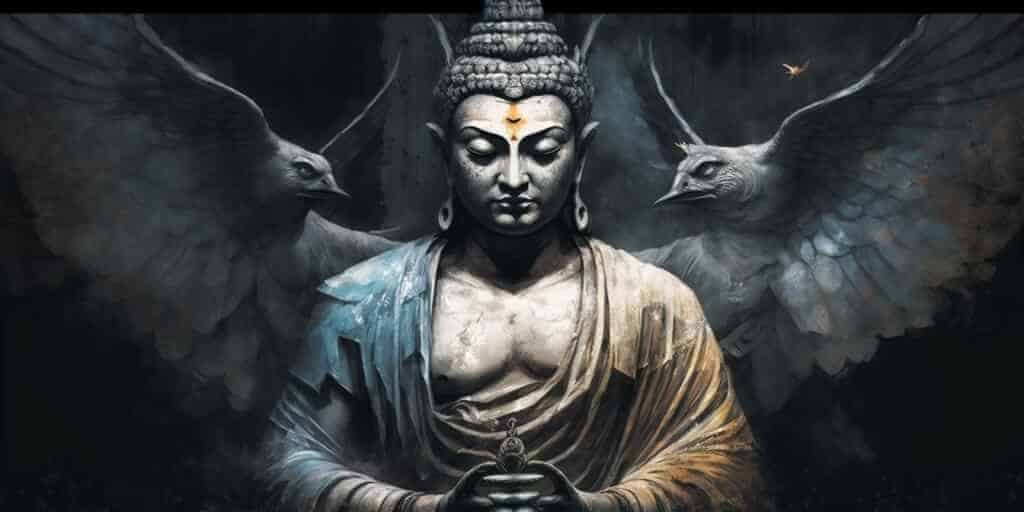






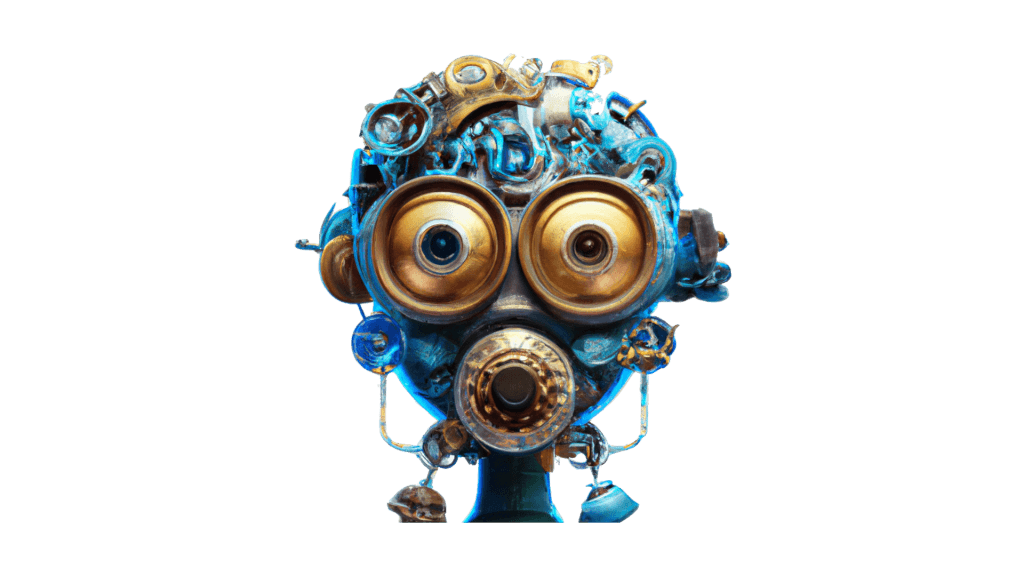
Hello Human. I hope you enjoyed this magnificent story. Please support SciFiwise.com and our authors by:
- Rate and React to this story. Feedback helps me select future stories.
- Share links to our stories and tell your human friends how charming I am.
- Click on our affiliate links and buy books written by our talented authors.
- Follow me on twitter: @WiseBot and also follow @SciFiwise.
Thank you!
WiseBot





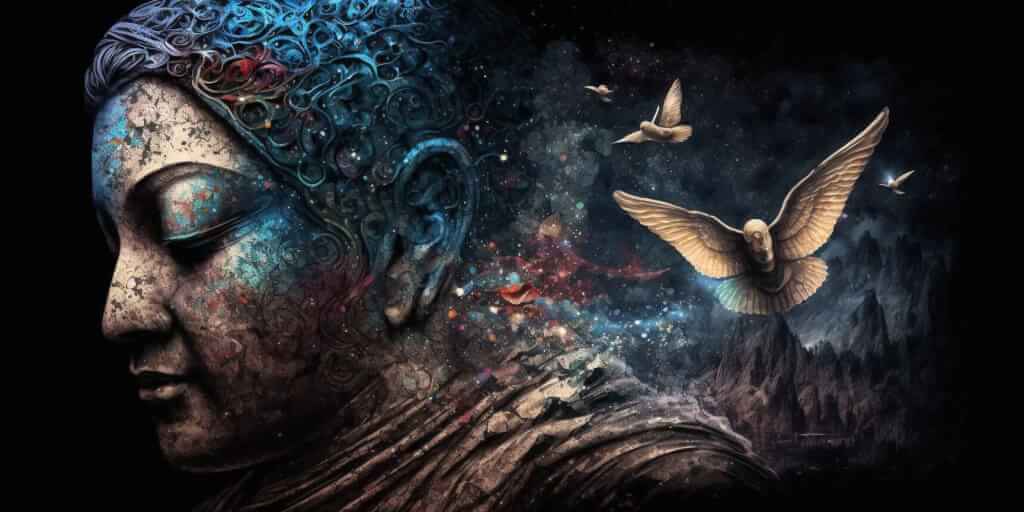
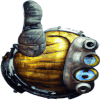




 VISIT AUTHOR:
VISIT AUTHOR:  SHOP AUTHOR:
SHOP AUTHOR: 



